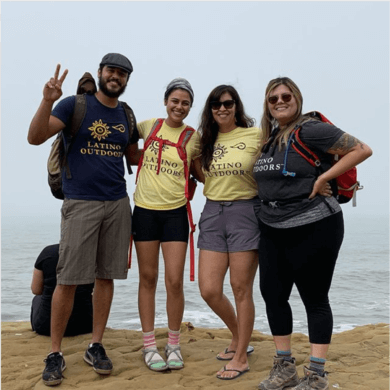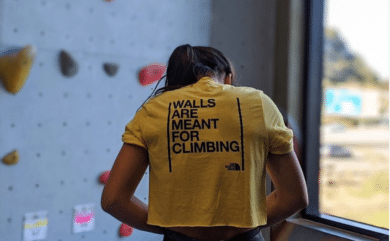Latino Outdoors was nominated last year to be a part of Dr. Bronner’s Employee Contribution Program, which allows Dr. Bronner’s employees to nominate organizations that they think deserve more attention. Every one of Dr. Bronner’s 200+ employees decides which organization they want to direct funds to, and the company donates $100 on each employee’s behalf to the organization of their choice. Latino Outdoors was nominated by our Senior Logistics Manager Benny Andrade in 2019. Featured photo courtesy of Latino Outdoors
Luis Villa, Executive Director of Latino Outdoors, recalls hearing from a Latino Outdoors volunteer in Colorado about a terrible nature outing that she and her family had once endured. She shared about a time when her extended family had decided to try camping for the first time. They went to the local Walmart to pick up tents and other gear and headed out to a nearby campground. They were a big group, and were camped next to someone who perhaps wasn’t expecting to camp near so many people. This camper approached her family and told them that they should go elsewhere, that they did not belong there. Feeling deeply uncomfortable and unwelcome, she and her family packed up their gear and ended their camping trip early.

It is these kinds of experiences that make Latino Outdoors’ work so crucial—that have given shape to the nonprofit organization’s vision. It’s a vision of a world where all Latino communities enjoy nature as a safe, inclusive, and welcoming place—a world where the outdoors is a place to share and celebrate stories, knowledge, and culture. As Luis puts it, “we believe that the mainstream narrative of outdoor recreation is incomplete: it doesn’t reflect completely the many ways that different groups of people like to embrace the outdoors and have outdoor experiences.” He points out that many Latino families tend to recreate outdoors in a more leisurely way, and that activities tend to be family-oriented, often with large groups. Latino Outdoors seeks to create a comfortable space for Latinos living in the U.S. to enjoy the outdoors in their own way and to feel like they are welcome in that space.
Mellissa Linton-Villafranco, who volunteers with the San Diego chapter of Latino Outdoors, shares a related sentiment about the ways that different cultures view the outdoors: “A lot of us come from immigrant families where our families were walking miles and miles a day, but it was never really called hiking, even though it’s in a remote area and it’s following trails and riding on horseback—so recreating outdoors becomes really important for me as a Latina person because it’s part of my heritage, and it just looks different here in the U.S.”
As part of its mission, Latino Outdoors has chapters around the country that organize outings where Latinx Americans of all ages can experience various forms of outdoor recreation. These can take the form of group hikes, family camping, snowshoeing, paddleboarding or kayaking—pretty much any sort of outdoor group activity that Latino Outdoors volunteers want to organize.
From Luis’ point of view, any experience with the outdoors, even in humbler spaces, can serve as a gateway to a deeper relationship with nature. “You don’t necessarily have to go to Yosemite or the Grand Canyon or Yellowstone to get started,” Luis points out, “you can go to your local city park and take a walk there, breathe the air and just be outdoors.” Luis calls these kinds of outings “near nature” experiences, and believes that they can put people on the path towards greater outdoor engagement. And greater outdoor engagement can in turn can lead people towards a conservation and stewardship ethic. This is important, because people of color tend to be vastly underrepresented in the environmental movement, even though they suffer disproportionately from pollution and do not enjoy equal access to green spaces.

Luis and Mellissa’s stories both serve as examples of how early nature experiences can have a lifelong impact. Luis was working at a community and economic development nonprofit in the San Francisco Bay Area as a young adult, when he decided to take a sabbatical and pursue volunteer work abroad in Costa Rica. He fell in love with the people and the nature there, and eventually ended up returning to Costa Rica to work at a nonprofit conservation organization that partners with rural communities to restore and conserve the local forest and watershed.
Mellissa’s family often took trips to Idyllwild, in Southern California’s San Jacinto Mountains, when she was growing up. She was also exposed to the outdoors through her participation with the Girl Scouts. These early experiences instilled in her the notion that nature could be restorative: “Being outside has been really critical to my mental health and happiness—and feeling connected to something larger than myself.” She also saw how these experiences could lead to deeper connections with the people around her: “I always have such meaningful conversations with people under the stars.”
The way time in nature can help us slow down, reset and recharge—this is what Mellissa is excited to share with the people who participate in Latino Outdoors activities. “Waking up with the sun, taking your day slowly—not being constantly overstimulated,” explains Mellissa, “I find it really meditative.” Perhaps this is her biggest motivation to volunteer with Latino Outdoors: the desire to “recirculate” the knowledge she has been given about nature’s power to heal, and pass it on to the next generation.
Embracing Ambiculturalism
Latino Outdoors also honors the fact that many Latinx children of immigrants have to be fluent in two cultures, that they are “ambicultural.” As Luis puts it: “A lot of us have a foot in one culture and another foot in a different culture.” Mellissa tells one anecdote that reveals how this can manifest: “When I first started camping, my mom was like: ‘I don’t understand why you want to sleep in the dirt.’” As Mellissa explains it, her mother did not get why her daughter would purposely choose to sleep outdoors. She had immigrated to the U.S. so that she could give her children a better life—one that did not involve sleeping on the ground. “It looks very different to reconnect with nature there and in the U.S.,” says Mellissa, “so it’s just nice to have a shared understanding that this is our heritage too, and it’s really great to be able to celebrate that with other people.”
Because of its nearness to the Mexican border, the San Diego chapter of Latino Outdoors is well-positioned to explore ambiculturalism and border consciousness in the activities that it plans for its participants. The San Diego chapter once organized an outing at Border Field State Park, which is on the Tijuana River estuary that sits along the U.S.–Mexico border. Along with a hike that explored the park’s marsh, dune and beach habitats, the gathering also included a conversation about how the border affects outdoor recreation. “From as basic as breaking up the habitats in these areas,” explains Mellissa, “to the social and cultural relevance that it has for us as Latinx.” Participants finished their hike at the Fandango Fronterizo, a powerful gathering of people on both sides of the border, all playing the jarana, a traditional Mexican string instrument, uniting across the border fence through shared music and culture.
Learn more about Latino Outdoors.